Episode 09: Political News Supply and Demand Curve
“Is ‘Trump fatigue’ real?”
Sachin and Andrew get the backstory on HuffPost’s “Trump fatigue” data investigation. Guests Ethan Klapper, Senior Social Media Editor at HuffPost, and Vincent Wu, Head of Insights & Growth at HuffPost, unpack supply and demand for politics news and how readers engage with Trump stories post-election. Plus, they go +1/-1 on YouTube and sports.
Trump and the zeitgeist
1:32 – Ethan Klapper, Senior Social Media Editor at HuffPost, explains the approach to politics coverage decisions pre- and post-election and the moments that mattered for HuffPost’s audience.
Ethan: “Trump was the story. So, it was not so much incorporation as much as it was just this is who we have to cover. To this day, Trump sucks so much of the air out of the room when it comes to politics. […] Without a doubt, this is what drove our audience for engagement and traffic and every other metric. It was stories related to Donald Trump.”
6:50 – Ethan discusses the mentality behind why people might not necessarily engage with Trump stories by sharing or commenting but they might amplify the opinion of others or take an action in real life, like protesting.
Ethan: “I think that when people are engaging with Trump coverage—and you certainly see this in our study—they will consume it, but I think people are oftentimes hesitant to do any sort of off-platform engagement with that type of content, meaning commenting on it, sharing it, tweeting about it. I think that is a function of people not wanting to cause rifts with their friends.”
Ethan: “If we can really cover the important moments of the Trump presidency and get the kind of engagement—meaningful engagement—that we feel is making a difference in people’s lives, even if we’re not covering every little last tweet he sends, I think that’s a sign that we’re doing things right here when it comes to Trump coverage. I think that we want to be really making a difference but not overdoing it, not oversupplying for the demand.”
Sachin: “When people think about what they are going to share, maybe the reason that, as Ethan described, they’re sharing things from celebrities or spokespeople, is because that feels like it’s less a part of their identity and feels like it’s more a part of the celebrity’s identity. But it still might be in line with how this individual is privately thinking or what they’re privately reading.”
Political news supply and demand: What the data said
15:27 – Vincent Wu, Head of Insights & Growth at HuffPost, explains what inspired his team to research whether or not people are tired of stories about Trump how the team was split into two camps with conflicting hypotheses.
Vincent: “I think the hypothesis is some people are saying there’s actually a Trump fatigue, some people are saying people are just shifting their behavior.”
22:22 – As it turns out, the data proved the opposite of Vincent’s personal hypothesis about Trump fatigue. People didn’t tire of Trump stories post-election; they still care and they’re still engaged.
Vincent: “I think the first finding that surprised me a lot is despite all the supply decrease—meaning all the publications are gradually writing less about Trump or politics stories—the average engagement per Trump story is actually pretty stable and there’s actually a slight increase on that.”

Vincent: “Content is a bit different than any other kind of economics. You can’t just say there’s less supply so you should expect a higher demand. You can’t say that because when people are consuming stories, they don’t realize that they have less stories to consume. Whether they engage, whether they actually push the button about share or comment, is very much decided by whether they like the story.”
Sachin: “I do think the one metric that maybe is thought about from ‘How much do I have and how much can I give?’ is time. People will decide, as you get deeper into the actual time and attention metrics, people will decide, ‘Do I read this article after visiting it, or do I not?’ And think that is more analogous to an economics supply and demand curve.”
29:17 – “Political junkies” are still engaged, but they aren’t only political junkies. Individuals are multifaceted, identifying with many interests, which points to the potentially overlooked value of politics audiences for advertisers.
Vincent: “During the election season, Trump and politics are everything. Now, of course […]Trump isn’t everything. There are some other topics, for example climate change, the Russia conversations, healthcare topics, LGBTQ topics, and those are actually getting a lot of attention, too. And most of them actually have a high engagement rate versus Trump and politics stories.”

Andrew: “Politics is one of these cross-cutting concerns across the entire U.S. population and the world. And you can’t, therefore, just pigeon-hole political content to be about a certain kind of consumer. Yes, there are political news junkies out there […] but really politics affects all of us.”
+1 or -1?
35:46 – Whether we should be paying more attention to YouTube.
39:44 – Sports, from a news coverage perspective and in general.
Show notes:
- Is ‘Trump Fatigue’ Real? How Reader Engagement Has Fared In The Post-Election Era, Vincent Wu, Julian Gilliatt, and Megan Xu, HuffPost
- 2017: The strange, scary and superlative, in 11 charts, Rani Molla, Recode (re: volume of Trump article page views)
- The Trump Bump of Readership, Clare Carr, Parse.ly (re: efficiency of sports content)
- The data shows it: Article pageviews and their value don’t correlate, Clare Carr, Digital Content Next (re: efficiency of sports content)
Thanks to Ethan Klapper and Vincent Wu for joining us as guests and to Nick Offenberg for engineering their interviews! The HuffPost interviews were recorded on February 28, 2018. The full episode was recorded on March 5, 2018.